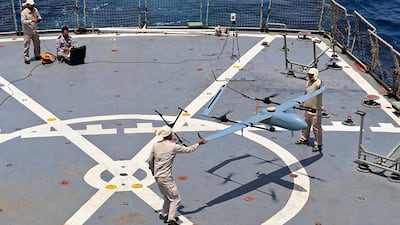Iran said on Monday it would “not seek permission” to strengthen its alliance with Russia, after the US warned that the growing partnership between the two countries is posing a threat to the Middle East.
The US is concerned that growing co-operation between the two countries focused on drones and missiles could lead to Iran expanding its reach in the region.
Russia also intends to supply Iran with new fighter jets, which would be a huge boost for its ageing air force. Iran has used “one way attack drones”, also dubbed Kamikaze drones, to attack commercial shipping. The same drones supplied to its Houthi militia allies have been used in frequent attacks on infrastructure in Saudi Arabia.
Iran has supplied hundreds of its Shahed-136 drone model to Russia since September, after reports that Russia was running low on drones and missiles.
Dozens of images of the drones’ wreckage have since emerged on social media, showing the distinctive debris of the V-wing explosive aircraft. Russia has used the weapons to attack Ukraine’s electricity infrastructure, knocking out power to millions of people in freezing winter conditions.
More attacks on Sunday evening hammered Kyiv’s power grid, leaving utility workers scrambling to restore electricity as the temperature plummets below zero.
The deployment of the weapons — and a feared delivery of Iranian Zolfaghar short range ballistic missiles — has led Ukraine’s allies to deploy cutting edge counter-drone systems such as Germany’s Gepard and the US's Patriot, which costs around $1 billion for a unit of six launchers.
CIA chief William Burns told PBS television on Friday the military co-operation between Iran and Russia “poses real threats” to US allies in the Middle East.
Nasser Kanani, spokesman for Iran's foreign ministry, called the comments “baseless” and said they were part of a “US propaganda war against Iran”.
Tehran “acts independently in regulating its foreign relations and does not seek permission from anyone”, Mr Kanani said on Sunday. Iran's “national interests” dictate its policies, he added.
“Co-operation between Iran and Russia in various fields including defence is expanding within the framework of common interests … and is not against any third country,” Mr Kanani said.
“American officials continue their baseless political claims and illegal actions against the Islamic republic of Iran, questioning the conventional defence and military co-operation between Iran and Russia.”
White House national security spokesman John Kirby on December 9 called the Tehran-Moscow military partnership “harmful” to Ukraine, Iran's neighbours and the world.
Last month, Tehran admitted it had sent drones to Russia but insisted they were supplied before the invasion of Ukraine in February.











